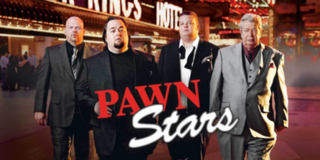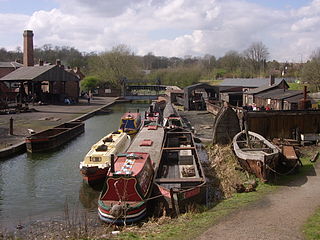
A pawnbroker is an individual or business that offers secured loans to people, with items of personal property used as collateral. The items having been pawned to the broker are themselves called pledges or pawns, or simply the collateral. While many items can be pawned, pawnshops typically accept jewelry, musical instruments, home audio equipment, computers, video game systems, coins, gold, silver, televisions, cameras, power tools, firearms, and other relatively valuable items as collateral.

The Black Country Living Museum is an open-air museum of rebuilt historic buildings in Dudley, West Midlands, England. It is located in the centre of the Black Country, 10 miles west of Birmingham. The museum occupies 105,000 square metres of former industrial land partly reclaimed from a former railway goods yard, disused lime kilns, canal arm and former coal pits.

A fence, also known as a receiver, mover, or moving man, is an individual who knowingly buys stolen goods in order to later resell them for profit. The fence acts as a middleman between thieves and the eventual buyers of stolen goods who may not be aware that the goods are stolen.

A mount of piety is an institutional pawnbroker run as a charity in Europe from Renaissance times until today. Similar institutions were established in the colonies of Catholic countries; the Mexican Nacional Monte de Piedad is still in operation.

Pawnbroking, lending money on portable security, began in ancient history. The practice was widespread in many parts of the world, from ancient Greece to medieval China and medieval Europe.

A second-hand shop is a shop which sells used goods.

Pawn Stars is an American reality television series shown on History and produced by Leftfield Pictures. The series is filmed in Las Vegas, Nevada, where it chronicles the daily activities at the World Famous Gold & Silver Pawn Shop, a 24-hour family business opened in 1989 and originally operated by patriarch Richard "Old Man" Harrison, his son Rick Harrison, Rick's son Corey "Big Hoss" Harrison, and Corey's childhood friend, Austin "Chumlee" Russell. The series, which became the network's highest rated show, and the No. 2 reality show behind Jersey Shore, debuted on July 26, 2009.

Hardcore Pawn is an American reality television series produced by RDF USA and Richard Dominick Productions for truTV about the day-to-day operations of American Jewelry and Loan, a family-owned and -operated pawn shop and broker in Detroit, Michigan's 8 Mile Road corridor.
Pawn Queens is a reality TV series about female pawn shop operators, airing on TLC, which premiered in 2010, following its pilot episode in 2010.

The Provident Loan Society of New York is a not-for-profit organization headquartered at 346 Park Avenue South on the corner of 25th Street in the Rose Hill neighborhood of Manhattan, New York City. It was created in the 19th century by a group of influential New Yorkers as an alternative to the loan sharks of the day. Founders include Robert W. De Forest, James Speyer, Otto T. Bannard, J. P. Morgan, Jacob H. Schiff, August Belmont, Jr. and Cornelius Vanderbilt II.

Richard Kevin Harrison is an American businessman, reality television personality, and owner of the Gold & Silver Pawn Shop which is featured on the History series Pawn Stars. Harrison and his father, Richard Benjamin Harrison, opened the shop in 1989, which they co-owned until his father's death in 2018.
Leslie Gold is an American pawnbroker, reality TV star, author, and media personality. He is known for his role on cable and satellite television truTV's reality series, Hardcore Pawn.

PT Pegadaian (Persero) is an Indonesian state-owned pawnbroker operated as a subsidiary of Bank Rakyat Indonesia. Formerly a pawnbroking monopoly, its monopoly was legalized in a Dutch East Indies government decree. Several savings and loan co-operatives de facto also offer pawnbroking services.

The boat dock at the Black Country Living Museum was built in 1976. Like many boat docks in the region its buildings are made out of recycled boat timbers from derelict wooden boats. The thousands of boats that used to work the Black Country canals all needed constant maintenance.

Gregory's General Store is an exhibit at the Black Country Living Museum. It once occupied numbers 89 & 90 Lawrence Lane, Old Hill, and was rebuilt on the museum site in 1980. It is set as it would have been in 1925.
Yossi Dina is an Israeli pawnbroker, businessman, entrepreneur, and reality television personality.

In 2014, there were 200 pawnbrokers in Hong Kong, with the number increasing over the next several years. Pawn shops are some of the oldest businesses in Hong Kong. The pawn shops themselves have several prominent features, including a screen to block the view of passersby, as well as a high counter. Additionally, these shops are governed by strict regulations, such as having to keep records of all transactions and being obliged to report any suspicious items to the authorities.

iPawn is a financial services company serving as an online lender and reseller for luxury goods. The company holds an online pawn shop license with headquarters in Tyler, Texas. iPawn raised over $4 million in investment and has been cited as one of the leading companies in transitioning the pawn industry to the internet.

The Pawnbrokers Act 2015 is a statute of the Parliament of Singapore that relates to pawnbrokers. The 2015 Act repeals and re-enacts the Pawnbrokers Act and also makes consequential amendments to certain other written laws.

Navajo trading posts flourished on the Navajo Indian Reservation in Arizona, New Mexico, and Utah from 1868 until about 1970. Trading posts, usually owned by non-Navajos, were the origin of many populated places on the reservation. They were often the center of commercial, cultural, and social life for the Navajos. At their peak in the first half of the 20th century about 100 trading posts were scattered around the reservation. The most important items and items traded and sold by the Navajo to the traders were wool, sheep and goat skins, and woven textiles. The most important items purchased by the Navajo at the trading posts were flour, sugar, coffee, tobacco, cloth, and canned goods. In the late 20th century, most trading posts were replaced by Navajo-owned businesses, shopping centers, and convenience stores.



















